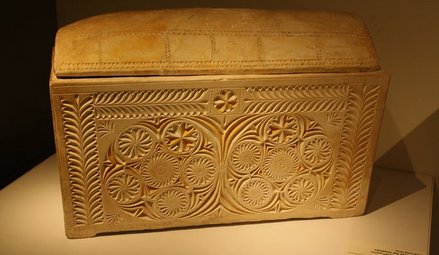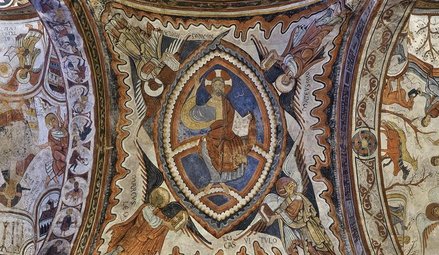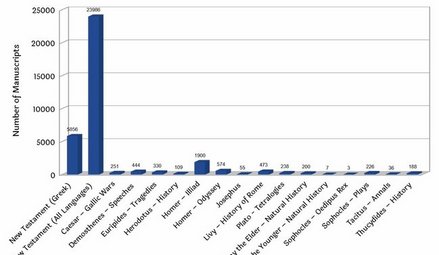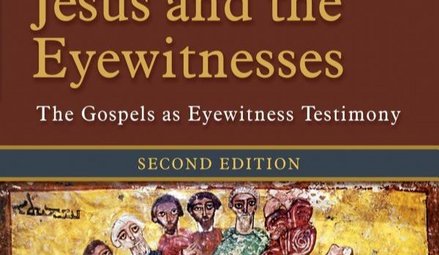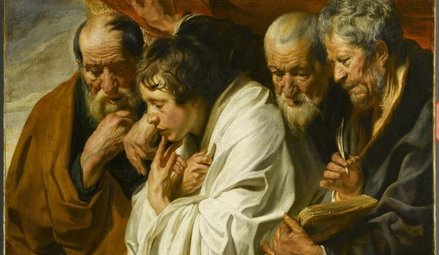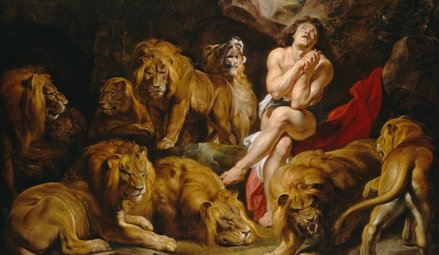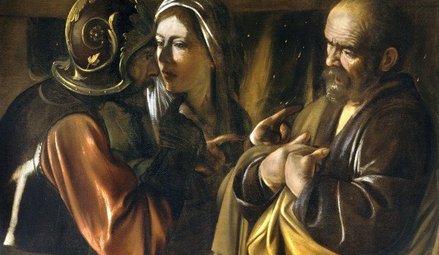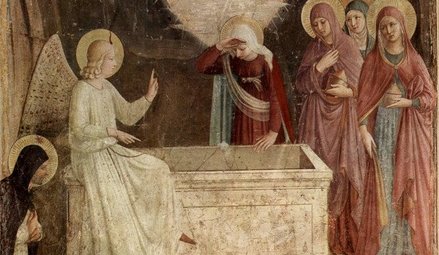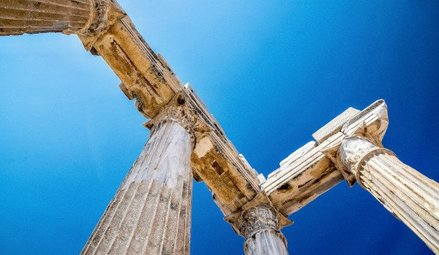- By theme
- Jesus
- The many proofs of Christ’s resurrection
- Saint Thomas Aquinas: God gave all the divine proofs we needed to believe
- The surpassing power of Christ's word
- Lewis’s trilemma: a proof of Jesus’s divinity
- God saves: the power of the holy name of Jesus
- Jesus spoke and acted as God's equal
- Jesus' divinity is actually implied in the Koran
- Jesus came at the perfect time of history
- Rabbinical sources testify to Jesus' miracles
- Mary
- The Church
- The Bible
- An enduring prophecy and a series of miraculous events preventing the reconstruction of the Temple
- The authors of the Gospels were either eyewitnesses or close contacts of those eyewitnesses
- Onomastics support the historical reliability of the Gospels
- The New Testament was not altered
- The New Testament is the best-attested manuscript of Antiquity
- The Gospels were written too early after the facts to be legends
- Archaeological finds confirm the reliability of the New Testament
- The criterion of embarrassment proves that the Gospels tell the truth
- The dissimilarity criterion strengthens the case for the historical reliability of the Gospels
- 84 details in Acts verified by historical and archaeological sources
- The unique prophecies that announced the Messiah
- The time of the coming of the Messiah was accurately prophesied
- The prophet Isaiah's ultra accurate description of the Messiah's sufferings
- Daniel's "Son of Man" is a portrait of Christ
- The Apostles
- Saint Peter, prince of the apostles
- Saint John the Apostle: an Evangelist and Theologian who deserves to be better known (d. 100)
- Saint Matthew, apostle, evangelist and martyr (d. 61)
- James the Just, “brother” of the Lord, apostle and martyr (d. 62 AD)
- Saint Matthias replaces Judas as an apostle (d. 63)
- The martyrs
- The protomartyr Saint Stephen (d. 31)
- Polycarp, bishop of Smyrna, disciple of John and martyr (d. 155)
- Saint Blandina and the Martyrs of Lyon: the fortitude of faith (177 AD)
- Saint Agatha stops a volcano from destroying the city of Catania (d. 251)
- Saint Lucy of Syracuse, virgin and martyr for Christ (d. 304)
- Thomas More: “The king’s good servant, but God’s first”
- The martyrdom of Paul Miki and his companions (d. 1597)
- The martyrs of Angers and Avrillé (1794)
- The Martyrs of Compiègne (1794)
- The Vietnamese martyrs Father Andrew Dung-Lac and his 116 companions (17th-19th centuries)
- He braved torture to atone for his apostasy (d. 1818)
- Blaise Marmoiton: the epic journey of a missionary to New Caledonia (d. 1847)
- José Luis Sanchez del Rio, martyred at age 14 for Christ the King (d. 1928)
- Saint Maximilian Kolbe, Knight of the Immaculate (d. 1941)
- The monks
- The Desert Fathers (3rd century)
- Saint Anthony of the Desert, a father of monasticism (d. 356)
- Saint Benedict, father of Western monasticism (d. 550)
- Saint Bruno the Carthusian (d.1101): the miracle of a hidden life
- Blessed Angelo Agostini Mazzinghi: the Carmelite with flowers pouring from his mouth (d. 1438)
- Monk Abel of Valaam's accurate prophecies about Russia (d. 1841)
- The more than 33,000 miracles of Saint Charbel Maklouf (d. 1898)
- Saint Pio of Pietrelcina (d. 1968): How God worked wonders through "a poor brother who prays"
- The surprising death of Father Emmanuel de Floris (d. 1992)
- The prophecies of Saint Paisios of Mount Athos (d. 1994)
- The saints
- Saints Anne and Joachim, parents of the Virgin Mary (19 BC)
- Saint Nazarius, apostle and martyr (d. 68 or 70)
- Ignatius of Antioch: successor of the apostles and witness to the Gospel (d. 117)
- Saint Gregory the Miracle-Worker (d. 270)
- Saint Martin of Tours: patron saint of France, father of monasticism in Gaul, and the first great leader of Western monasticism (d. 397)
- Saint Lupus, the bishop who saved his city from the Huns (d. 623)
- Saint Dominic of Guzman (d.1221): an athlete of the faith
- Saint Francis, the poor man of Assisi (d. 1226)
- Saint Anthony of Padua: "everyone’s saint"
- Saint Rose of Viterbo or How prayer can transform the world (d. 1252)
- Saint Simon Stock receives the scapular of Mount Carmel from the hands of the Virgin Mary
- The unusual boat of Saint Basil of Ryazan
- Saint Agnes of Montepulciano's complete God-confidence (d. 1317)
- The extraordinary conversion of Michelina of Pesaro
- Saint Peter Thomas (d. 1366): a steadfast trust in the Virgin Mary
- Saint Rita of Cascia: hoping against all hope
- Saint Catherine of Genoa and the Fire of God's love (d. 1510)
- Saint Anthony Mary Zaccaria, physician of bodies and souls (d. 1539)
- Saint Ignatius of Loyola (d. 1556): "For the greater glory of God"
- Brother Alphonsus Rodríguez, SJ: the "holy porter" (d. 1617)
- Martin de Porres returns to speed up his beatification (d. 1639)
- Virginia Centurione Bracelli: When God is the only goal, all difficulties are overcome (d.1651)
- Saint Marie of the Incarnation, "the Teresa of New France" (d.1672)
- St. Francis di Girolamo's gift of reading hearts and souls (d. 1716)
- Rosa Venerini: moving in the ocean of the Will of God (d. 1728)
- Seraphim of Sarov (1759-1833): the purpose of the Christian life is to acquire the Holy Spirit
- Camille de Soyécourt, filled with divine fortitude (d. 1849)
- Bernadette Soubirous, the shepherdess who saw the Virgin Mary (1858)
- Saint John Vianney (d. 1859): the global fame of a humble village priest
- Gabriel of Our Lady of Sorrows, the "Gardener of the Blessed Virgin" (d. 1862)
- Father Gerin, the holy priest of Grenoble (1863)
- Blessed Francisco Palau y Quer: a lover of the Church (d. 1872)
- Saints Louis and Zelie Martin, the parents of Saint Therese of Lisieux (d. 1894 and 1877)
- The supernatural maturity of Francisco Marto, “contemplative consoler of God” (d. 1919)
- Saint Faustina, apostle of the Divine Mercy (d. 1938)
- Brother Marcel Van (d.19659): a "star has risen in the East"
- Doctors
- The mystics
- Lutgardis of Tongeren and the devotion to the Sacred Heart
- Saint Angela of Foligno (d. 1309) and "Lady Poverty"
- Saint John of the Cross: mystic, reformer, poet, and universal psychologist (+1591)
- Blessed Anne of Jesus: a Carmelite nun with mystical gifts (d.1621)
- Catherine Daniélou: a mystical bride of Christ in Brittany
- Saint Margaret Mary sees the "Heart that so loved mankind"
- Mother Yvonne-Aimée of Jesus' predictions concerning the Second World War (1922)
- Sister Josefa Menendez, apostle of divine mercy (d. 1923)
- Edith Royer (d. 1924) and the Sacred Heart Basilica of Montmartre
- Rozalia Celak, a mystic with a very special mission (d. 1944)
- Visionaries
- Saint Perpetua delivers her brother from Purgatory (203)
- María de Jesús de Ágreda, abbess and friend of the King of Spain
- Discovery of the Virgin Mary's house in Ephesus (1891)
- Sister Benigna Consolata: the "Little Secretary of Merciful Love" (d. 1916)
- Maria Valtorta's visions match data from the Israel Meteorological Service (1943)
- Berthe Petit's prophecies about the two world wars (d. 1943)
- Maria Valtorta saw only one pyramid at Giza in her visions... and she was right! (1944)
- The 700 extraordinary visions of the Gospel received by Maria Valtorta (d. 1961)
- The amazing geological accuracy of Maria Valtorta's writings (d. 1961)
- Maria Valtorta's astronomic observations consistent with her dating system
- Discovery of an ancient princely house in Jerusalem, previously revealed to a mystic (d. 1961)
- The popes
- The great witnesses of the faith
- Saint Augustine's conversion: "Why not this very hour make an end to my uncleanness?" (386)
- Thomas Cajetan (d. 1534): a life in service of the truth
- Madame Acarie, "the servant of the servants of God" (d. 1618)
- Blaise Pascal (d.1662): Biblical prophecies are evidence
- Madame Élisabeth and the sweet smell of virtue (d. 1794)
- Jacinta, 10, offers her suffering to save souls from hell (d. 1920)
- Father Jean-Édouard Lamy: "another Curé of Ars" (d. 1931)
- Christian civilisation
- The depth of Christian spirituality
- John of the Cross' Path to perfect union with God based on his own experience
- The dogma of the Trinity: an increasingly better understood truth
- The incoherent arguments against Christianity
- The "New Pentecost": modern day, spectacular outpouring of the Holy Spirit
- The Christian faith explains the diversity of religions
- Cardinal Pierre de Bérulle (d.1629) on the mystery of the Incarnation
- Christ's interventions in history
- Marian apparitions and interventions
- The Life-giving Font of Constantinople
- Our Lady of Virtues saves the city of Rennes in Bretagne (1357)
- Mary stops the plague epidemic at Mount Berico (1426)
- Our Lady of Miracles heals a paralytic in Saronno (1460)
- Cotignac: the first apparitions of the Modern Era (1519)
- Savona: supernatural origin of the devotion to Our Lady of Mercy (1536)
- The Virgin Mary delivers besieged Christians in Cusco, Peru
- The victory of Lepanto and the feast of Our Lady of the Rosary (1571)
- The apparitions to Brother Fiacre (1637)
- The “aldermen's vow”, or the Marian devotion of the people of Lyon (1643)
- Our Lady of Nazareth in Plancoët, Brittany (1644)
- Our Lady of Laghet (1652)
- Saint Joseph’s apparitions in Cotignac, France (1660)
- Heaven confides in a shepherdess of Le Laus (1664-1718)
- Zeitoun, a two-year miracle (1968-1970)
- The Holy Name of Mary and the major victory of Vienna (1683)
- Heaven and earth meet in Colombia: the Las Lajas shrine (1754)
- The five Marian apparitions that traced an "M" over France, and its new pilgrimage route
- A series of Marian apparitions and prophetic messages in Ukraine since the 19th century (1806)
- "Consecrate your parish to the Immaculate Heart of Mary" (1836)
- At La Salette, Mary wept in front of the shepherds (1846)
- Our Lady of Champion, Wisconsin: the first and only approved apparition of Mary in the US (1859)
- Gietrzwald apparitions: heavenly help to a persecuted minority
- The silent apparition of Knock Mhuire in Ireland (1879)
- Mary "Abandoned Mother" appears in a working-class district of Lyon, France (1882)
- The thirty-three apparitions of the Virgin Mary in Beauraing (1932)
- "Our Lady of the Poor" appears eight times in Banneux (1933)
- Fontanelle-Montichiari apparitions of Our Lady "Rosa Mystica" (1947)
- Mary responds to the Vows of the Polish Nation (1956)
- Zeitoun apparitions
- The Virgin Mary comes to France's rescue by appearing at L'Ile Bouchard (1947)
- Maria Esperanza Bianchini and Mary, Mary, Reconciler of Peoples and Nations (1976)
- Luz Amparo and the El Escorial apparitions
- The extraordinary apparitions of Medjugorje and their worldwide impact
- The Virgin Mary prophesied the 1994 Rwandan genocide (1981)
- Our Lady of Soufanieh's apparition and messages to Myrna Nazzour (1982)
- The Virgin Mary heals a teenager, then appears to him dozens of times (1986)
- Seuca, Romania: apparitions and pleas of the Virgin Mary, "Queen of Light" (1995)
- Angels and their manifestations
- Mont Saint-Michel: Heaven watching over France
- Angels give a supernatural belt to the chaste Thomas Aquinas (1243)
- The constant presence of demons and angels in the life of St Frances of Rome (d. 1440)
- Mother Yvonne-Aimée escapes from prison with the help of an angel (1943)
- Saved by Angels: The Miracle on Highway 6 (2008)
- Exorcisms in the name of Christ
- A wave of charity unique in the world
- Saint Peter Nolasco: a life dedicated to ransoming enslaved Christians (d. 1245)
- Saint Angela Merici: Christ came to serve, not to be served (d. 1540)
- Saint John of God: a life dedicated to the care of the poor, sick and those with mental disorders (d. 1550)
- Saint Camillus de Lellis, reformer of hospital care (c. 1560)
- Blessed Alix Le Clerc, encouraged by the Virgin Mary to found schools (d. 1622)
- Saint Vincent de Paul (d. 1660), apostle of charity
- Marguerite Bourgeoys, Montreal's first teacher (d. 1700)
- Frédéric Ozanam, inventor of the Church's social doctrine (d. 1853)
- Damian of Molokai: a leper for Christ (d. 1889)
- Pier Giorgio Frassati (d.1925): heroic charity
- Saint Dulce of the Poor, the Good Angel of Bahia (d. 1992)
- Mother Teresa of Calcutta (d. 1997): an unshakeable faith
- Heidi Baker: Bringing God's love to the poor and forgotten of the world
- Amazing miracles
- The miracle of liquefaction of the blood of St. Januarius (d. 431)
- The miracles of Saint Anthony of Padua (d. 1231)
- Saint Pius V and the miracle of the Crucifix (1565)
- Saint Philip Neri calls a teenager back to life (1583)
- The resurrection of Jérôme Genin (1623)
- Saint Francis de Sales brings back to life a victim of drowning (1623)
- Saint John Bosco and the promise kept beyond the grave (1839)
- The day the sun danced at Fatima (1917)
- Pius XII and the miracle of the sun at the Vatican (1950)
- When Blessed Charles de Foucauld saved a young carpenter named Charle (2016)
- Reinhard Bonnke: 89 million conversions (d. 2019)
- Miraculous cures
- The royal touch: the divine thaumaturgic gift granted to French and English monarchs (11th-19th centuries)
- With 7,500 cases of unexplained cures, Lourdes is unique in the world (1858-today)
- Our Lady at Pellevoisin: "I am all merciful" (1876)
- Mariam, the "little thing of Jesus": a saint from East to West (d.1878)
- Gemma Galgani: healed to atone for sinners' faults (d. 1903)
- The miraculous cure of Blessed Maria Giuseppina Catanea
- The extraordinary healing of Alice Benlian in the Church of the Holy Cross in Damascus (1983)
- The approved miracle for the canonization of Juan Diego Cuauhtlatoatzin (1990)
- Healed by St Charbel Makhlouf, her scars bleed each month for the benefit of unbelievers (1993)
- The miracle that led to Brother André's canonisation (1999)
- Bruce Van Natta's intestinal regrowth: an irrefutable miracle (2007)
- He had “zero” chance of living: a baby's miraculous recovery (2015)
- Manouchak, operated on by Saint Charbel (2016)
- How Maya was cured from cancer at Saint Charbel's tomb (2018)
- Preserved bodies of the saints
- Dying in the odour of sanctity
- The body of Saint Cecilia found incorrupt (d. 230)
- Stanislaus Kostka's burning love for God (d. 1568)
- Blessed Antonio Franco, bishop and defender of the poor (d. 1626)
- The incorrupt body of Marie-Louise Nerbollier, the visionary from Diémoz (d. 1910)
- The great exhumation of Saint Charbel (1950)
- Bilocations
- Inedias
- Levitations
- Lacrimations and miraculous images
- Saint Juan Diego's tilma (1531)
- The Rue du Bac apparitions of the Virgin Mary to St. Catherine Labouré (Paris, 1830)
- Mary weeps in Syracuse (1953)
- Teresa Musco (d.1976): salvation through the Cross
- Soufanieh: A flow of oil from an image of the Virgin Mary, and oozing of oil from the face and hands of Myrna Nazzour (1982)
- The Saidnaya icon exudes a wonderful fragrance (1988)
- Our Lady weeps in a bishop's hands (1995)
- Stigmates
- The venerable Lukarda of Oberweimar shares her spiritual riches with her convent (d. 1309)
- Blessed Maria Grazia Tarallo, mystic and stigmatist (d. 1912)
- Saint Padre Pio: crucified by Love (1918)
- Elena Aiello: "a Eucharistic soul"
- A Holy Triduum with a Syrian mystic, witnessing the sufferings of Christ (1987)
- A Holy Thursday in Soufanieh (2004)
- Eucharistic miracles
- Lanciano: the first and possibly the greatest Eucharistic miracle (750)
- A host came to her: 11-year-old Imelda received Communion and died in ecstasy (1333)
- Faverney's hosts miraculously saved from fire
- A tsunami recedes before the Blessed Sacrament (1906)
- Buenos Aires miraculous host sent to forensic lab, found to be heart muscle (1996)
- Relics
- The Veil of Veronica, known as the Manoppello Image
- For centuries, the Shroud of Turin was the only negative image in the world
- The Holy Tunic of Argenteuil's fascinating history
- Saint Louis (d. 1270) and the relics of the Passion
- The miraculous rescue of the Shroud of Turin (1997)
- A comparative study of the blood present in Christ's relics
- Jews discover the Messiah
- Francis Xavier Samson Libermann, Jewish convert to Catholicism (1824)
- Our Lady of the Miraculous Medal and the conversion of Alphonse Ratisbonne (1842)
- Max Jacob: a liberal gay Jewish artist converts to Catholicism (1909)
- Edith Stein - Saint Benedicta of the Cross: "A daughter of Israel who, during the Nazi persecutions, remained united with faith and love to the Crucified Lord, Jesus Christ, as a Catholic, and to her people as a Jew"
- Patrick Elcabache: a Jew discovers the Messiah after his mother is miraculously cured in the name of Jesus
- Cardinal Aron Jean-Marie Lustiger (d. 2007): Chosen by God
- Muslim conversions
- Buddhist conversions
- Atheist conversions
- The conversion of an executioner during the Terror (1830)
- God woos a poet's heart: the story of Paul Claudel's conversion (1886)
- Dazzled by God: Madeleine Delbrêl's story (1924)
- C.S. Lewis, the reluctant convert (1931)
- The day André Frossard met Christ in Paris (1935)
- MC Solaar's rapper converts after experiencing Jesus' pains on the cross
- Father Sébastien Brière, converted at Medjugorje (2003)
- Franca Sozzani, the "Pope of fashion" who wanted to meet the Pope (2016)
- Nelly Gillant: from Reiki Master to Disciple of Christ (2018)
- Testimonies of encounters with Christ
- Near-death experiences (NDEs) confirm Catholic doctrine on the Four Last Things
- The NDE of Saint Christina the Astonishing, a source of conversion to Christ (1170)
- Jesus audibly calls Alphonsus Liguori to follow him (1723)
- Blessed Dina Bélanger (d. 1929): loving God and letting Jesus and Mary do their job
- Gabrielle Bossis: He and I
- André Levet's conversion in prison
- Journey between heaven and hell: a "near-death experience" (1971)
- Alicja Lenczewska: conversations with Jesus (1985)
- Vassula Ryden and the "True Life in God" (1985)
- Nahed Mahmoud Metwalli: from persecutor to persecuted (1987)
- The Bible verse that converted a young Algerian named Elie (2000)
- Invited to the celestial court: the story of Chantal (2017)
- Providential stories
- The superhuman intuition of Saint Pachomius the Great
- Germanus of Auxerre's prophecy about Saint Genevieve's future mission, and protection of the young woman (446)
- Seven golden stars reveal the future location of the Grande Chartreuse Monastery (1132)
- The supernatural reconciliation of the Duke of Aquitaine (1134)
- Saint Zita and the miracle of the cloak (13th c.)
- Joan of Arc: "the most beautiful story in the world"
- John of Capistrano saves the Church and Europe (1456)
- A celestial music comforts Elisabetta Picenardi on her deathbed (d. 1468)
- Gury of Kazan: freed from his prison by a "great light" (1520)
- The strange adventure of Yves Nicolazic (1623)
- Julien Maunoir miraculously learns Breton (1626)
- Pierre de Keriolet: with Mary, one cannot be lost (1636)
- How Korea evangelized itself (18th century)
- A hundred years before it happened, Saint Andrew Bobola predicted that Poland would be back on the map (1819)
- The prophetic poem about John Paul II (1840)
- Don Bosco's angel dog: Grigio (1854)
- Thérèse of Lisieux saved countless soldiers during the Great War
- Lost for over a century, a Russian icon reappears (1930)
- In 1947, a rosary crusade liberated Austria from the Soviets (1946-1955)
- The discovery of the tomb of Saint Peter in Rome (1949)
- He should have died of hypothermia in Soviet jails (1972)
- God protects a secret agent (1975)
- Flowing lava stops at church doors (1977)
- A protective hand saved John Paul II and led to happy consequences (1981)
- Mary Undoer of Knots: Pope Francis' gift to the world (1986)
- Edmond Fricoteaux's providential discovery of the statue of Our Lady of France (1988)
- The Virgin Mary frees a Vietnamese bishop from prison (1988)
- The miracles of Saint Juliana of Nicomedia (1994)
- Global launch of "Pilgrim Virgins" was made possible by God's Providence (1996)
- The providential finding of the Mary of Nazareth International Center's future site (2000)
- Syrian Monastery shielded from danger multiple times (2011-2020)
- Jesus
- Who are we?
- Make a donation
TOUTES LES RAISONS DE CROIRE
La Bible
n°58
Holy Land
8th century BC
The prophet Isaiah's ultra accurate description of the Messiah's sufferings
After evoking the conception of the Messiah (Is 7:14), his birth (Is 9:5), his preaching(Is 9:1), his power(Is 11:1) and the meaning of his mission(Is 25:8; 28:16; 42:6), the prophet Isaiah also announced him as a "Suffering Servant", in very striking terms, beginning in chapter 42 of his book, particularly in chapter 53: "spurned and avoided by men, a man of suffering, knowing pain [...]. Yet it was our pain that he bore, our sufferings he endured. We thought of him as stricken, struck down by God and afflicted, but he was pierced for our sins, crushed for our iniquity. He bore the punishment that makes us whole,by his wounds we were healed."(Is 53:3-5). All these predictions were perfectly fulfilled in the Passion and Resurrection of Christ, and in the Redemption he offers us.
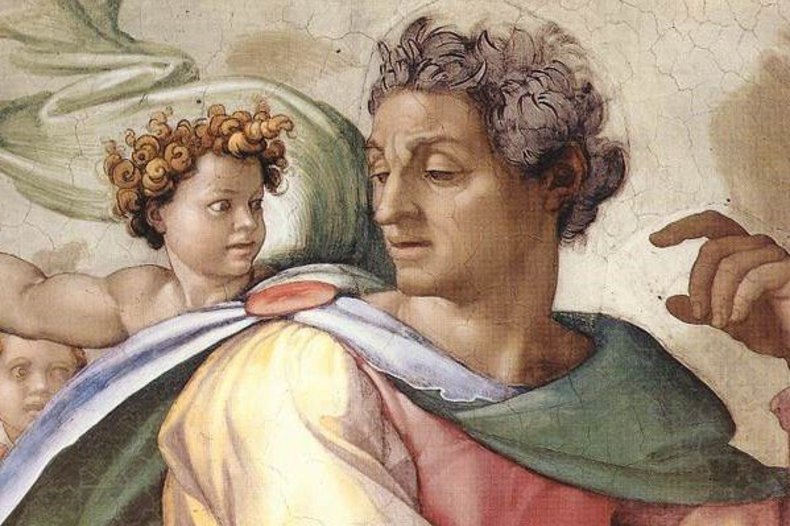
Isaiah (detail), Michelangelo, 1509, Sistine Chapel, Vatican, Rome /© CC0/wikimedia
Les raisons d'y croire :
- It is historically indisputable that text of Isaiah existed several centuries before Jesus Christ was born.
- The Great Isaiah Scroll, a complete scroll from the 2nd century with all 66 chapters of the Book of Isaiah, was found in 1946 among the famous Dead Sea Scrolls in the Qumran Cave. It is on permanent display at the Shrine of the Book in Jerusalem at the Israel Museum.
- Chapter 53 in particular, which prophesies the history and destiny of a "Suffering Servant" who will "justify the many" (Is 53:11) by taking their sin upon himself (Is 53:12), has moved all those who meditated on it over the centuries.
- Ancient Jewish tradition has always seen in this text an announcement of the suffering Messiah (cf. Talmud, Sanhedrin 98b), even if modern rabbis try to find all sorts of way to interpret it differently.
- Described in this chapter is an astonishing prophecy of Christ's Passion and Resurrection, and a very remarkable announcement of the Redemption he brought about.
- This prophecy, like all those that foretold Christ, is historically unprecedented and unique, and an important reason to believe that adds to all the others.
Synthèse :
The portrait of the "Suffering Servant" is painted very eloquently by the prophet Isaiah, especially in chapter 53 of his book:
"Here is my servant whom I uphold, my chosen one with whom I am pleased"(Is 42:1).
"Upon him I have put my Spirit" (Is 42:1).
"He will not cry out, nor shout, nor make his voice heard in the street" (Is 42:2).
"See, my servant shall prosper, he shall be raised high and greatly exalted." (Is 52:13).
"Kings shall stand speechless before him" (Is 52:15).
"He was spurned and avoided by men" (Is 53:3).
"A man of sorrows, familiar with suffering "(Is 53:3).
"Like someone whose face is hidden, despised, we took no notice of him "(Is 53:3).
"Yet it was our pain that he bore, our sufferings he endured" (Is 53:4).
"And we regarded him as punished, struck down by God and humiliated "(Is 53:4).
"He was pierced for our transgressions, crushed for our iniquities "(Is 53:5).
"The chastisement that gives us peace is upon him" (Is 53:5).
"In his wounds we find healing "(Is 53:5).
"The Lord has laid on him the iniquities of us all" (Is 53:6).
"Though harshly treated, he humbled himself; he did not open his mouth "(Is 53:7).
"Like a lamb led to slaughter "(Is 53:7).
"Like a mute sheep before the shearers, he opened nothis mouth" (Is 53:7).
"Seized and condemned, he was taken away" (Is 53:8).
"Who would have thought any more of his destiny? For her was cut off from the land of the living "(Is 53:8).
"For he was struck for the sins of his people " (Is 53:8).
"He was given a grave among the wicked, a burial place with evildoers" (Is 53:9).
"But it was the LORD’s will to crush him with pain" (Is 53:10).
"By making his life as a reparation offering, he shall see his offspring, shall lengthen his days" (Is 53:10).
"and the LORD’s will shall be accomplished through him." (Is 53:10).
"Because of his anguish he shall see the light; because of his knowledge he shall be content" (Is 53:11).
"My servant, the just one, shall justify the many" (Is 53:11).
"their iniquity he shall bear"(Is 53:11).
"Therefore I will give him his portion among the many, and he shall divide the spoils with the mighty"(Is 53:12).
"Because he surrendered himself to death, was counted among the transgressors" (Is 53:12).
"Bore the sins of many, and interceded for the transgressors" (Is 53:12).
Psalm 22 is also very prophetic:
"My God, my God, why have you forsaken me" (Ps 22:2).
"All who see me scorn me, they sneer and shake their heads" (Ps 22:8).
"He counted on the Lord: let him deliver him! Let him save him, for he is his friend" (Ps 22:9).
"Like water I run away; all my bones are broken" (Ps 22:15).
"My tongue sticks to my jaw" (Ps 22:16).
"A band of rascals surrounds me" (Ps 22:17).
"They pierce my hands and feet" (Ps 22:17).
"I can count all my bones" (Ps 22:18).
"They divide my garments and cast lots for my clothing" (Ps 22:19).
"Not one of his bones will be broken" (Ps 34:21).
"Even my trusted friend who ate my bread betrayed me" (Ps 41:10).
"Insult has broken my heart, and I despair" (Ps 69:21).
"I hoped for compassion, but in vain, for comforters, and I found none "(Ps 69:21).
"When I was thirsty, they gave me vinegar to drink"(Ps 69:22).
This passage from the Book of Wisdom also evokes the persecuted righteous man:
"Let us lay snares for the righteous, since he hinders us and opposes our conduct, reproaching us for our faults against the Law and accusing us of faults against our upbringing "(Wis 2:12).
"He prides himself on his knowledge of God and calls himself a child of the Lord" (Wis 2:13).
"He has become a reproach to our thoughts; even the sight of him is a burden to us" (Wis 2:14).
"For his way of life is not like others, and his paths are all different" (Wis 2:15).
"He judges us debased, and avoid our paths as from uncleanness" (Wis 2:16).
"He proclaims the final fate of the righteous to be a happy one and boasts that God is his father" (Wis 2:16).
"Let's see if what he says is true, let's find out what his end will be" (Wis 2:17).
"For if the righteous man is the son of God, he will help him and deliver him from the hands of his enemies" (Wis 2:18).
"Let us test him by insult and torture, that we may know his gentleness and put his resignation to the test" (Wis 2:19).
"Let us condemn him to a shameful death, since, according to what he says, God will take care of him" (Wis 2:20).
"So they reason, but they are mistaken, for their wickedness blinds them" (Wis 2:21).
"They know not the secrets of God; they expect no reward for holiness" (Wis 2:22).
"They do not believe in the reward of pure souls" (Wis 2:22).
"Yes, God created man to be imperishable; he made him an image of his own nature" (Wis 2:23).
"Death entered the world through the devil's envy "(Wis 2:24).
"Those who belong to him experience it" (Wis 2:24).
In Jewish tradition, the ancient Synagogue recognised the awaited Messiah in the figure of the Suffering Servant. The rabbis wrote, for example: "The Messiah is called the leprous member because it is said: 'He bore our sufferings and took upon himself our sorrows, and we regarded him as punished, smitten by God and afflicted'" (Is 53:4) " (Talmud, Sanhedrin 98b). The Midrash Yalkut similarly states that Psalm 22 describes the sufferings of the Messiah, as reported in the Dissertation on the invocation of the saints in the Synagogue by David-Paul Drach (DISSA, p. 33). Furthermore, the same David-Paul Drach explains that, from the earliest times, the Synagogue believed that the "cessation of the defilement or original stain was to take place only at the advent of the Messiah; which means that the Christ of the Lord was to extirpate this venom (cf. the great Yalkut-Reuben fol. 16, col. 1)" (DISSA, p. 31-33), adding: "Now, as regards the retroactive effect of the infinite merit of the sufferings of the son of David, let us ask the elders (Deut 32:7), and they will tell us (Midrasch Yalkut, second part, n 359 dealing with chapter 60 of Isaiah):
"Satan said before the Most Holy One, blessed be he: 'Master of the universe, whose light is this under your glorious throne?' God answered him, 'He who will one day turn you back and cover your face with confusion.' Satan said to him, 'Master of the universe, show me.' God answered him: 'Come and see him.' And as soon as he saw him, he was shaken with a great trembling, and fell on his face, saying, 'Surely this is the Messiah, who will one day cast me down into hell with all the unfaithful nations!'
Then the Most Holy One, blessed be He, began to make terms with the Messiah, saying to him: 'Those who have taken refuge with you, their sins will one day subject you to a yoke of iron and make you like a calf whose eyes are dim, and they will cause your soul to be oppressed by this yoke; and as a result of their sins your tongue will one day remain attached to your palate (Ps 22:16). Do you agree to this?' Then the Messiah said before the Most Holy One, blessed be he: 'Master of the universe, perhaps this torment will last for several years?' The Most Holy One, blessed be he, answered him: 'By your life and by the life of your head, I have pronounced upon you a week (Dan 9:5). If your soul grieves, I will reject those whom you must save from this moment.' And he said before him, 'Master of the universe, it is with the joy of my heart and the gladness of my heart that I accept everything, on condition that not a single one of Israel will be lost. And not only the living shall be saved in my days, but also those who are deposited in the earth. And not only the dead will be saved in my days, but also all those who have died since the days of Abraham, the first man. And not only these, but also the unborn will be saved in my days. This is what I agree to, this is what I accept.'
The Doctors also teach that in the week of the coming of the son of David, they will bring iron beams and load them on his neck until his waist bends in two, and he will cry out and weep so loudly that his voice will go up to heaven. He will say before God: 'Master of the universe, how far will my limbs be able to stand?Am I not flesh and blood?'"
It should be noted, however, that modern rabbis who have rejected Christianity try very hard to interpret these passages differently, or even to ignore them, especially the poignant chapter 53 of the book of Isaiah.
In Christianity's view of the accomplishment of the prophecies, the Passion of Christ and its profound meaning are truly in perfect correspondence with everything that was foretold by the prophets on this subject, down to the smallest detail (Lk 24:26).
Olivier Bonnassies
Au-delà des raisons d'y croire :
- It is important to understand the logic of the Redemption brought by Christ and how it works, as Billy Graham explained to someone who asked "I don't understand why the death of Jesus almost 2,000 years ago makes any difference to me right now"
Aller plus loin :
- Website Messianic Prophecies Fulfilled by Jesus Christ










